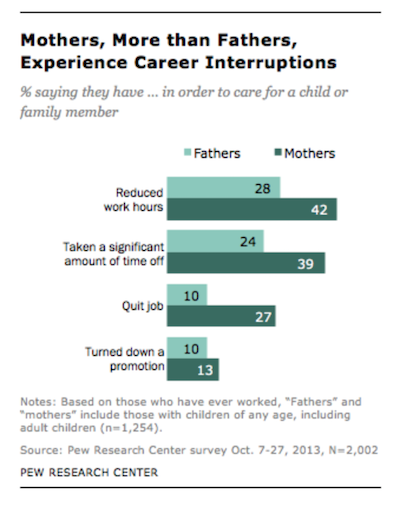By Rasika Rajagopalan, Human Resources Business Partner, SmartBear Software

It's no secret that the United States is far behind other industrialized countries when it comes to maternity leave policies. Last year, the United Nations' International Labor Organization released a report claiming that
out of all 185 countries in the data set, the United States was one of only three countries that did not provide cash benefits for maternity leave. This news is certainly alarming, and many companies, including us here at SmartBear, have taken notice and are actively making additions to their leave policies to support new mothers and provide fully-paid coverage. A topic that isn't commonly discussed is
paternity leave. Here are the reasons why having a strong paternity leave program is critical to achieving gender equality and well-being in the workplace.
Eradicating Gender Norms
Many women constantly struggle to balance their childcare responsibilities with their work life.
Research shows that 58% of women say that their parental duties affect their work progress. Only 19% of fathers share the same sentiment. In a world that claims to attempt to equal the playing field, it's impossible to set a true standard when new moms are given a leave of absence and new fathers are not. While Massachusetts recently released a law allocating eight weeks of unpaid leave to new fathers, this is not the reality for most states. Being the sole parent at home, managing your newborn is an incredibly stressful experience and creates an isolated environment for a new mother. Furthermore, it creates a societal expectation that the woman is the primary caregiver responsible for attending to a newborn. In today's world, where
40% of women are the sole or primary breadwinners for their families, this is not only unprogressive but unsustainable. Parenting is a partnership, and both men and women should be given the option to raise their newborn.
Minimizing the Impact of Being on Leave
Taking three months of maternity leave has ripple effects for women when it comes to their own progression in the workplace. Aside from the stigma and discrimination women face for "having misaligned priorities" or "having too much on their plates to juggle real responsibilities," there are some long-term effects of being out of the office for a significant period of time.
Women earn a third less than men after returning from maternity leave. Their salaries and promotion opportunities begin to plateau around this time. Women with children also receive fewer calls for interviews and receive an average of $11,000 less for the same roles that women without children attain. Overall, childbearing moms make 5% less per child than do women who don't have children.
Ironically, fathers benefit from
having children in the workplace.
Men's earnings increase by more than 6% when they have children, and they don't experience the same plateauing effect as women. This difference may be because men are perceived as caring individuals who work to provide for their families. Normalizing the idea of being on leave for childcare may reduce the stigma.
In countries that have extended paternity leave programs, most men take the full allotted time, especially when they see their coworkers taking advantage of the program.
 Providing More Support for Families
Providing More Support for Families
Of the women taking maternity leave,
only 74% come back to their jobs, and only 40% continue to work full time. This is mostly because the workplace doesn't prioritize familial care, and parents don't necessarily have the flexibility they need to be both parents and professionals.
The research shows that new fathers who stay home, even for two weeks after the birth of their children, end up more involved in the child's care nine months later. This research accounts for even the most day-to-day tasks, including feeding, bathing, and changing diapers. The idea is that being involved from the onset allocates an equal amount of responsibility and sets both parents up to be competent and committed caregivers. When it comes down to it, equal opportunity cannot be achieved when fundamental expectations are different among groups.
Opinions expressed by the author are not necessarily those of WITI.
Are you interested in boosting your career, personal development, networking, and giving back? If so, WITI is the place for you! Become a WITI Member and receive exclusive access to attend our WITI members-only events, webinars, online coaching circles, find mentorship opportunities (become a mentor; find a mentor), and more!
Founded in 1989, WITI (Women in Technology International) is committed to empowering innovators, inspiring future generations and building inclusive cultures, worldwide. WITI is redefining the way women and men collaborate to drive innovation and business growth and is helping corporate partners create and foster gender inclusive cultures. A leading authority of women in technology and business, WITI has been advocating and recognizing women's contributions in the industry for more than 30 years.
The organization delivers leading edge programs and platforms for individuals and companies -- designed to empower professionals, boost competitiveness and cultivate partnerships, globally. WITI’s ecosystem includes more than a million professionals, 60 networks and 300 partners, worldwide.
WITI's Mission
Empower Innovators.
Inspire Future Generations.
Build Inclusive Cultures.
As Part of That Mission WITI Is Committed to
Building Your Network.
Building Your Brand.
Advancing Your Career.

 It's no secret that the United States is far behind other industrialized countries when it comes to maternity leave policies. Last year, the United Nations' International Labor Organization released a report claiming that out of all 185 countries in the data set, the United States was one of only three countries that did not provide cash benefits for maternity leave. This news is certainly alarming, and many companies, including us here at SmartBear, have taken notice and are actively making additions to their leave policies to support new mothers and provide fully-paid coverage. A topic that isn't commonly discussed is paternity leave. Here are the reasons why having a strong paternity leave program is critical to achieving gender equality and well-being in the workplace.
It's no secret that the United States is far behind other industrialized countries when it comes to maternity leave policies. Last year, the United Nations' International Labor Organization released a report claiming that out of all 185 countries in the data set, the United States was one of only three countries that did not provide cash benefits for maternity leave. This news is certainly alarming, and many companies, including us here at SmartBear, have taken notice and are actively making additions to their leave policies to support new mothers and provide fully-paid coverage. A topic that isn't commonly discussed is paternity leave. Here are the reasons why having a strong paternity leave program is critical to achieving gender equality and well-being in the workplace.
Comments